Research News

The soldier’s face has faded in the World War II photograph, falling victim to the ravages of time. Yet, even as the picture has turned cloudy, the image of her father has grown sharper in Barbara Presnell’s mind. Presnell, an award-winning documentary poet and essayist, has captured the story of her father William G. Presnell in her Blue Star collection, published earlier this year by Press 53 in Winston-Salem.

The sounds that fill hospital rooms can take on a discordant tone, as life-sustaining equipment beeps, hisses and blares. Chapel Hill non-profit DooR to DooR breaks through the noise, bringing to health care settings the sounds of a different healing sort, as documented in the new film “The Acoustics of Care.”

When streetlights burn out in the Enderly Park neighborhood, the darkness closes in, causing residents to worry about safety. UNC Charlotte geography undergraduate students Jamal Covington and Devin Martin have created a way for residents to use mobile devices to easily report issues such as burned-out lights.

They are born all over the planet, some 3.5 million of them a year, beginning life as tiny flickers in the grass. They grow fast; feeding on forests, devouring ground, turning landscapes into ash. As these fires burn, atmospheric scientist Brian Magi is watching, researching the connections between fire, land, atmosphere and climate – and the role humans play in that mix.

Two on-campus entities have conducted research to improve student experiences and outcomes related to career readiness, with the added benefit of providing Communications Studies students hands-on research experience.

In the contemporary world, natural sciences and philosophy may seem to be worlds apart. Yet, these disciplines are not always estranged. Trevor Pearce, a UNC Charlotte philosophy assistant professor, currently is researching the historical connections between philosophy and biology, and he has found that the innovative method of thought utilized by pragmatists can prove relevant to contemporary education.

Common sense suggests that dangerous prison conditions will deter released prisoners from committing more crimes and returning to prison. However, studies by UNC Charlotte researcher Shelley Listwan have found that harsh prison conditions may actually push prisoners the opposite direction.
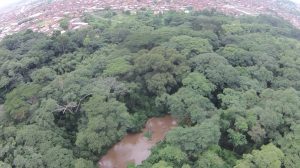
Surrounded by the sprawl of a modern city, the dense forest grove of Osun-Osogbo in southwestern Nigeria has long stood as a silent sentry guarding the mysteries of the ancient past. Those secrets are now revealed by UNC Charlotte researcher Akin Ogundiran, whose work has upended long-held views of how West Africa became a global economic player.

The College of Liberal Arts & Sciences is now part of the UNC Charlotte Data Science Initiative, joining the College of Computing and Informatics, Belk College of Business, and the College of Health and Human Services as part of this strategic partnership. Jean-Claude Thill, Knight Foundation Distinguished Professor of Public Policy and Director of Project Mosaic, has agreed to serve as the DSI Director for the College of Liberal Arts & Sciences.
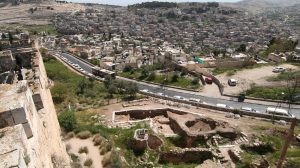
UNC Charlotte’s team that is conducting archaeological excavations on Mount Zion in Jerusalem has discovered a rare gold coin bearing the image of the Roman Emperor Nero. The coin is exceptional, as the first example of a coin of this kind turning up in Jerusalem in a scientific dig.

As Hurricane Katrina ravaged New Orleans in 2005, people worldwide converged around TVs to witness the devastation of an iconic city and government’s response to the storm. This catastrophic, life-altering event served as a pivotal point in UNC Charlotte researcher Cherie Maestas’ career.
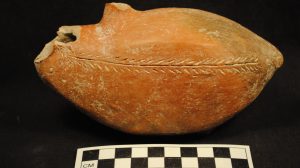
The soil in the ancient Cyprus field is the color of parchment paper and packed hard. On an early summer day with temperatures that creep toward 100 degrees, UNC Charlotte researchers Steven Falconer and Pat Fall carefully dig through centuries of archaeological sediments, inch by painstaking inch.
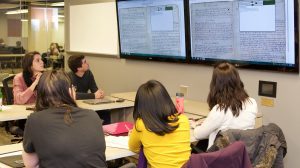
In the fragile pages of recipe books from the early modern period, UNC Charlotte researcher Jennifer Munroe and her students find traces of life and death. They decipher the words and absorb the daily struggles and joys of the women who created these chronicles of life between 1550 and 1800. These books are much more than repositories for recipes. Through the process of transcription, scholars worldwide are digitizing images of each page of old books, transcribing the vocabulary and script and publishing the content in online databases for the world to study and share.

UNC Charlotte Professor Emeritus Ted Arrington has won third place in Common Cause’s second annual Gerrymander Standard Writing Competition. Arrington’s paper presented criteria for determining when districting arrangements so distort the process of translating votes into seats in a legislature that the process or the redistricting plan rises to a constitutional violation.
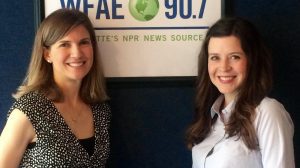
One in every eight couples nationwide struggles to conceive or maintain a pregnancy. At least 4,000 people are seeking infertility treatment in Charlotte. As Charlotte emerges as a hub of knowledge and resources on the topic, two UNC Charlotte researchers are focused on improving how caregivers and patients communicate around this medical condition.

Hundreds of UNC Charlotte undergraduates have participated in the Charlotte Research Scholars initiative at UNC Charlotte in a 10-week summer program. Those chosen receive a scholarship to work closely with faculty mentors conducting research and participate in professional development sessions to better prepare them for graduate school and careers.

The drive to learn how the sun weathers rock has taken UNC Charlotte earth scientist Martha-Cary “Missy” Eppes to great lengths – to the arid deserts of the Southwest, the periglacial boulder fields of Pennsylvania and Virginia, and even to the surface of Mars. Mechanical weathering, the physical means by which rock is broken into smaller fragments, is one of the primary processes that defines Earth as we know it. Without it, there would be no erosion, no soil, no sediment from which resources like water and oil can be readily drawn, and no ready access to rock nutrients that are required by flora and in turn, fauna.

Jerusalem, rich in culture, history and historical conflict, is the spiritual capital of the Western world. Since 2007, a large, complex archaeological excavation has been conducted there under the direction of UNC Charlotte in an archaeological investigation perhaps unlike any other.